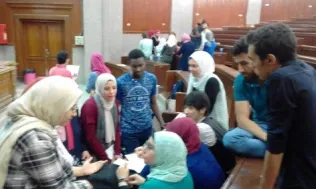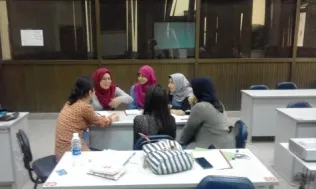2018 Activity Report
March Activity Report
31 March 2019
Global Japan Office Coordinator
MORITA Mitsuaki
On March 9, the “Great East Japan Earthquake Memorial Concert” was held, and students from Cairo University performed the song “Shima Uta”, as they did the previous year. This event is attended by many people from Japanese language education institutions all over Egypt, and is a very good and rare opportunity for students to meet students from other institutions, which seems to result in more motivation towards their studies.
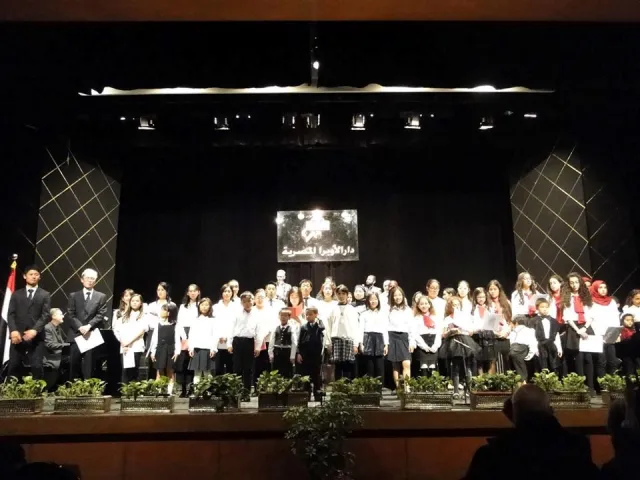
In mid-March, my first-year students’ first visitor session with Japanese exchange students was held, during which four Japanese students (three from Osaka University, one from TUFS) participated in interviews with the Egyptian students. As I predicted, my students were very nervous, but they managed to communicate despite this. Next time I would love for the students to gather together outside of class too.
Lastly, on March 30, the “25th Japanese Speech Competition” was held at Cairo University. Japanese learners from almost all of the Japanese language education institutions in Egypt participated in this competition, demonstrating the fruits of their efforts as best they could. A student from the Cairo University Faculty of Arts’ Japanese Translation department, which was only established last fall, won the beginner’s division, and students from Benha University, which only established a Japanese department three years ago, won both the elementary and intermediate divisions. The advanced division was won, for the second year in a row, by a student from the Cairo University Faculty of Arts’ Japanese Language and Literature department. While the results are important, the students who participated said things such as “I’m glad I gave it a go” and “I was able to show everything I practiced” regardless of their results, and a few students who didn’t enter said that they wish they had, so I think the competition itself was very meaningful for the students. I want to continue assisting students as they actively challenge themselves in competitions like this.
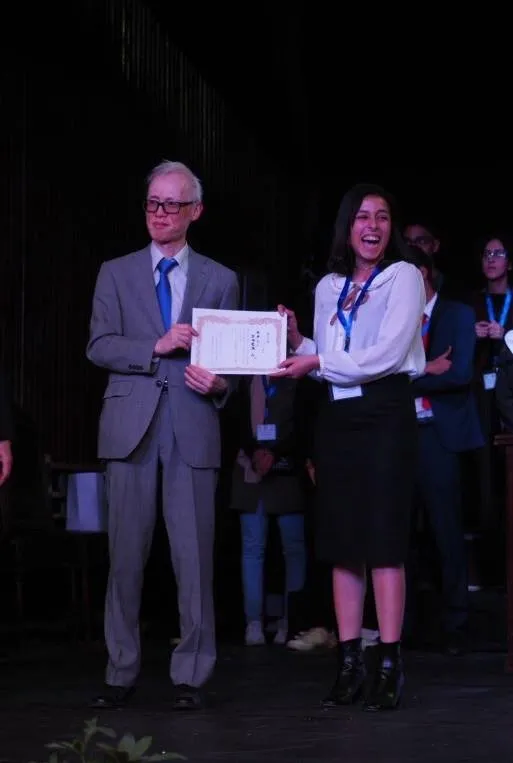
February Activity Report
28 February 2019
Global Japan Office Coordinator
MORITA Mitsuaki
In February, the brief winter break ended, and classes began for the new semester. Different from summer vacation, the winter break is short, so there were far less students that claimed to have “forgotten Japanese” while they were away. However, apparently the timetable for this semester is the busiest of the whole year, and I even saw some first-year students losing motivation due to the schedule being “physically demanding”, which is a tad worrisome. Cairo University is famous for having all first-year students finish both book one and two of the “Minna no Nihongo” textbook series, but this is unfortunately not possible this year, as the semester will end 2-3 weeks earlier than last year due to Ramadan (fasting month). The fast pace of the course remains unchanged, but the teachers must work together to ensure the students are learning Japanese they can actually use, and not just understand.
In other news, I have been conducting discussions with second-year students during their conversation classes on the topic of “cases of cultural collisions between Japanese and Egyptian people”, in which I have students think about both the Japanese and Egyptian ways of thinking, their cultures, and how they can go about solving problems that arise between them. At Cairo University, over half of the students in this department study abroad in Japan during their third year, and when they return I often hear them say “Japanese people are cold” and “I didn’t make any Japanese friends”, so I decided to hold this kind of class as preparation for future exchanges. I was a little worried, as I took on a support role for this class and let the students have more autonomy, but I was relieved as everyone actively participated in the discussion. There was no right or wrong opinion in this discussion class, but I think it helped broaden the students’ ways of thinking, which is a plus for their futures.
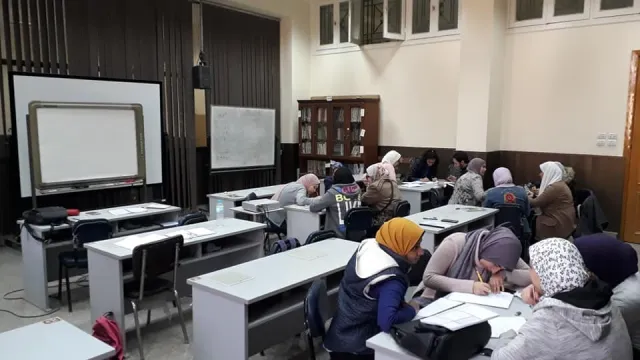
I’ve also been quite busy helping students practice rehearsing songs for the Great East Japan Earthquake memorial event and speeches for the speech competition, which will both be held in March, and preparing for visitor sessions. The students, of course, have been busy preparing for mid-term exams. I hope they are all using each day of this short semester wisely.
January Activity Report
31 January 2019
Global Japan Office Coordinator
MORITA Mitsuaki
January was all about final exams. In the Faculty of Arts’ Japanese Language and Literature Department, foreign staff are exempt from proctor responsibilities, but this is not the case for the new Translation Department, so I proctored an exam for the first time. The atmosphere of the exam was normal to me, but the Egyptian staff who helped me proctor were surprised and commented on how “students studying Japanese are so quiet and polite.” I asked what they meant by this and found out that, depending on the department, some students cheat and talk throughout exams, and the proctors have to tell them off, so it is usually quite a busy job. I don’t think this is a matter of “because it’s Egypt” or “because it’s Japan”, but I am being careful to ensure that nothing like this ever happens among the students studying Japanese.
Also, the December JLPT results were announces at the end of January. The JLPT isn’t the be all end all of Japanese language learning, but quite a lot of importance is placed on exams and certifications in Egypt, so the students looked nervous. In the Japanese Language and Literature Department, second-year students’ results are summarized for overseas exchange purposes, but I think that we should also summarize the results of other year groups to show what level students can expect to reach after four years in this department at Cairo University. We could also use these summaries to compare results with those of other universities, which could lead to motivation-based relations for all parties involved.
Lastly, while not related to the university, the “Middle East Japanese Language Education Seminar” was held in mid-January. Japanese language teachers from many countries including Egypt, Turkey, UAE, Bulgaria and Latvia, gathered to discuss and exchange opinions on teaching methods and issues at each of their institutions. With this in mind, some people suggested holding regular study sessions, which I hope will lead to the further development of Japanese language education in Egypt.
December Activity Report
31 December 2018
Global Japan Office Coordinator
MORITA Mitsuaki
December began with the Japanese Language Proficiency Test, which is only held once a year in Egypt. This time, the test was held at Al-Azhar University instead of Cairo University, and many students came to sit the test. I stepped in as proctor of the N2 classroom, of which I recognized over half of the students, so I was nervous for them.
After the JLPT, classes at the university came to an end, and it was time for the final exams. Around this time, a student came to me and excitedly told me to follow her. She led me to a classroom where the Japanese culture class is held, and all the students were inside wearing yukata. Here at Cairo University, there is a Japanese culture class, which puts emphasis on understanding Japanese culture as opposed to just learning the language. The students were rushing around in the 10 minutes before their class stated, but managed to quickly put on their yukata and take photos together. I think the next step for the first-year students is working on their reading comprehension, but I think I will use the wide reading activities that Mr. Takahashi showed me, and add more cultural components to the assigned class readings, to also improve the students’ understanding of other cultures.
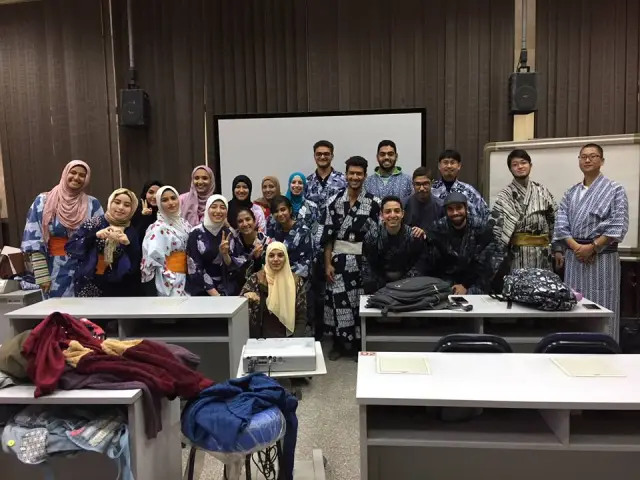
The first semester of the Translation Department, which has 55 students, has finally come to an end, and their first exam period has begun. The whole university has now entered into the exam period, and some classrooms even have desks lined up outside of them, giving the campus an overall bizarre feeling. I hope that students don’t just study for the exams, but rather see them as a chance to know their current abilities that they can use to work towards their future goals.
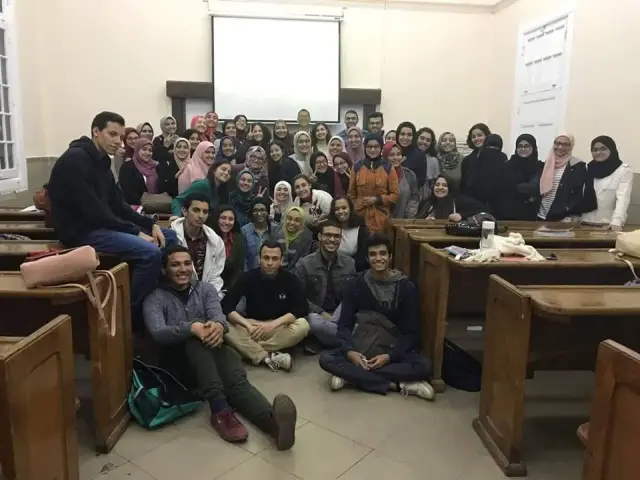
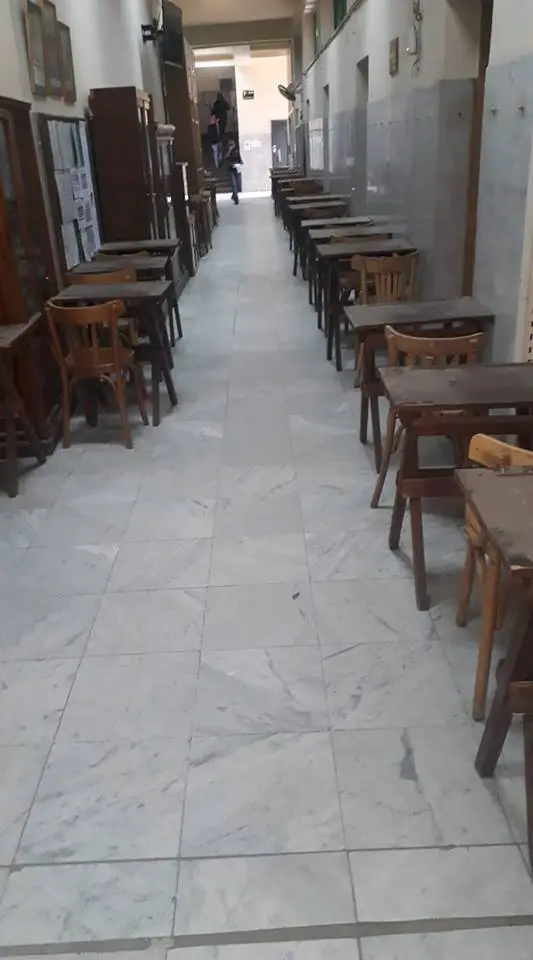
November Activity Report
30 November 2018
Global Japan Office Coordinator
MORITA Mitsuaki
Going into November, temperatures in Cairo dropped instantly. Rain, which is said to only happen once or twice a year, fell four times in one week, and it was a strange feeling watching students happily discuss the “abnormal weather”.
On November 10, two Japanese exchange students from Osaka University and three from TUFS participated in my second-year students’ keigo (honorifics) class. Despite the class starting at 10am, the students arrived at 8am and I was a little worried at how restless they seemed. However, I realized they had split themselves into groups to decorate the desks with Egyptian ornaments, prepare snacks and pour juice, all to show their own type of omotenashi (hospitality). Most of the comments from Egyptian students were along the lines of “this was a good experience, I want to do it again”, so I think I will try to hold this class again in the future.
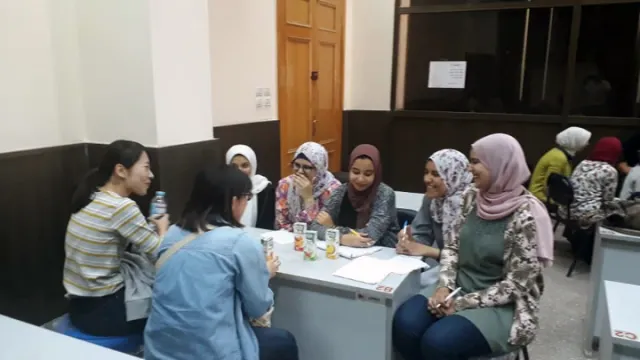
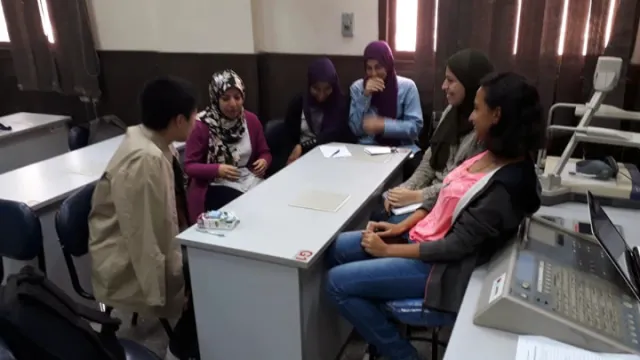
In other news, the Japan Exchange Fair was held at Cairo University on the 26th, and Ain Shams University on the 27th, at which a presentation on TUFS, as well as presentations on Kyushu University, Tokyo Institute of Technology and the University of Tsukuba, were given. Most universities gave their presentations in English, but for TUFS’ presentation, I spoke in Japanese and had an Egyptian assistant interpret into Arabic for me. Thanks to this, I was able to appeal to Egyptian students who don’t understand English, which I felt was a strength of my presentation. This fair was not only attended by Cairo University students from the Japanese Language and Literature Department, but also by students from the Translation Department, and even by students from far away universities such as Benha University. This year there was also a presentation about exchanges through the Egypt Japan Education Program (EJEP), which even I was quite interested in. It was a good opportunity for me to sit up straight and think about how I can make my classes improve the Japanese abilities of my students even more, so that even one more of them can go on exchange.
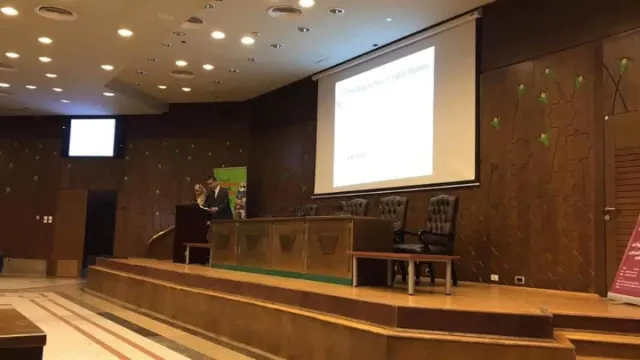
The mid-term exams also finished this month, and the semester is finally coming to a close, but I am still giving my all to make it to the end with my students.
October Activity Report
31 October 2018
Global Japan Office Coordinator
MORITA Mitsuaki
It has been one month since the new semester began. As the temperatures cool down, I feel like the busy days also seem to be settling down.
October, as usual, was full of Japan-related events, so I would like to report on these. First, on October 12, the Cairo Japanese School (CJS) had their Sports Festival, so I participated as a chaperone for my students. The students had fun doing foot races, tug of war and ball-toss, and I watched practiced movements and cheering contest of the CJS students with great interest. I hope my students continue to find motivation through coming into contact with Japanese people and the Japanese culture.
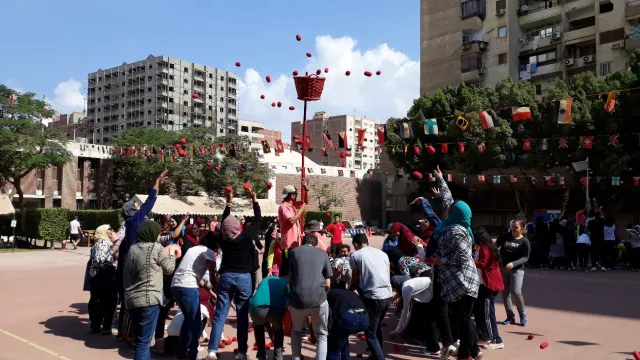
On the 26th, the Japanese Society held its Fall Festival, in which over 30 Egyptian students participated as volunteers, and many more students came to enjoy Japanese food and bon-odori (Bon festival dance). I also attended as the “coordinator of Egyptian volunteers”, and was nervous as to whether any problems would arise, but each student worked hard to help with cooking, selling goods and serving customers, and were able to get through the event without any complaints. Different to the relaxed atmosphere of the Sports Festival, at the Fall Festival, students were on the “management side” of things, and so many had different impressions of the whole experience. However, most of them still said they wanted to participate next year as well, so I was relieved.
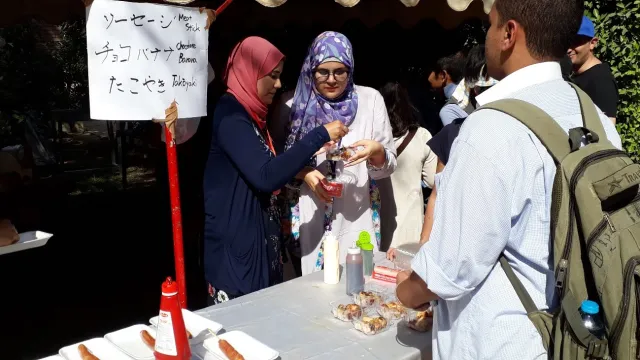
Touching on this month’s classes a bit, the second-year students are focusing on keigo (honorifics) from this year onwards, and I am planning to have Japanese guests from TUFS and Osaka University visit the students for an assignment I am planning called “Interview in Keigo”. While they are nervous, the students are putting their all into preparing for this task, and I am looking forward to seeing how they do. The mid-term exam will be held in November, so I hope the students are doing each thing they can so they won’t end up crying on the day.
September Activity Report
30 September 2018
Global Japan Office Coordinator
MORITA Mitsuaki
The long long summer has come to an end, and the new semester began on September 22. On the same day, and on the 23rd, the 2nd Japan Research Symposium was held at Cairo University’s Center for Japan Studies. Starting with professors from Kurume University and Tokai University, many researchers were invited to give presentations at this event from Japan, Egypt and Saudi Arabia. TUFS alumnus Professor SUZUKI Hiroyuki, who conducts research in Palestine, also gave a presentation.
Since the presentations were all in the field of “Japan Research”, they covered a wide range of historical, linguistic, cultural and economic topics. These presentations were very stimulating for both the students who helped as volunteers, and myself. I hope this symposium continues to become a hub for Japan research in the Arab world.
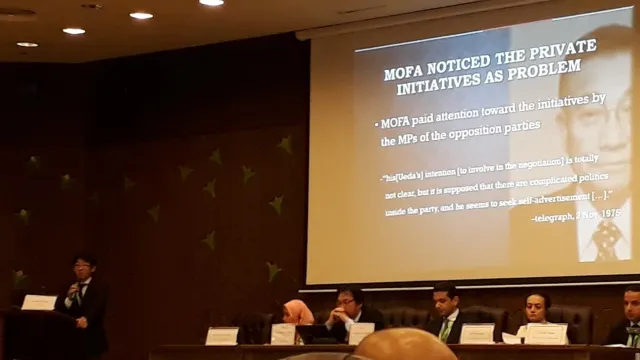
Moving on, classes began around the same time for the Japanese Language and Literature department, and something a little surprising happened. Apparently, it is possible to change your department in the first week of classes, and so every day students and parents would come to my class and try to directly negotiate with me, saying things such as “please let me in, I want to learn Japanese no matter what!”
Even then, it is impossible to teach a class with numbers any larger than this, but I held interviews anyway, and the 125 applicants I wrote about last month became 260, of which I let in a total of 34 new students. The new students were quickly faced with the challenge of hiragana and katakana, but their eyes were glistening as they worked hard to keep up.
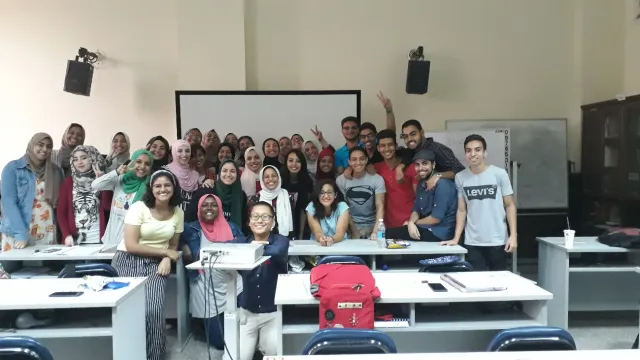
Egyptians are known for being exceptionally friendly, but I find the Egyptian student-teacher dynamic a bit troubling. Because of this, I told students at the orientation that “learning Japanese is not just about words, it is also about learning Japanese etiquette”. I am teaching the first-year students to knock and say “excuse me” when they enter the room, and “thank you, excuse me” when they have finished. The second-year students are studying keigo (honorifics) and improving their speech skills alongside studying pre-intermediate Japanese.
The first and second-year students have their sights set on studying abroad in Japan, but I hope they set their goals further than that so they can keep moving forward after the exchange.
Also, from this semester, a new Japanese Translation Department has been established in Cairo University’s Faculty of Literature, and 50 new students have been accepted into this course of study. I will be teaching one class a week in this course, so I will also report on this from now on.
August Activity Report
31 August 2018
Global Japan Office Coordinator
MORITA Mitsuaki
The hot hot summer is never-ending, but the summer vacation is finally coming to an end. In Egypt, “Eid al-Adha” (Festival of Sacrifice) was held from August 21-24, so cows and sheep were being slaughtered all over the city, and the smell of blood wafted through the streets.
After Eid, new students entered Cairo University, and there were 125 applicants for the Faculty of Literature’s Japanese Language and Literature department, where I work. I conducted one-on-one interviews with each of the applicants, and in the end 27 students were accepted into the department. For the students who didn’t make it, please keep working hard.
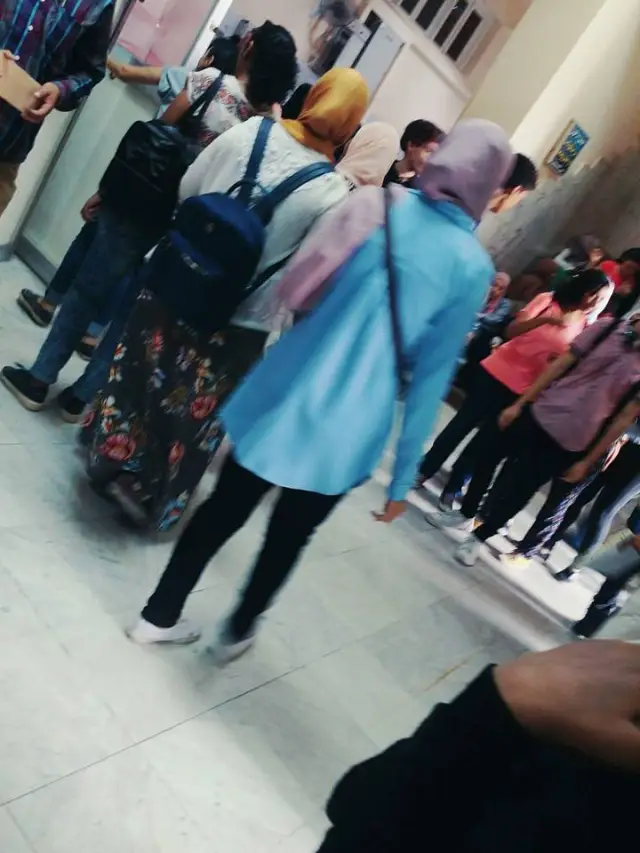
Finally, the students who will be going on exchange to Japan from September came to say goodbye. Some were excited, some were nervous and some were revising their Japanese, but I hope all of them think about what it means to be able to receive a scholarship and go on exchange, and come back having found their next goal without just stopping at “going on an exchange”.
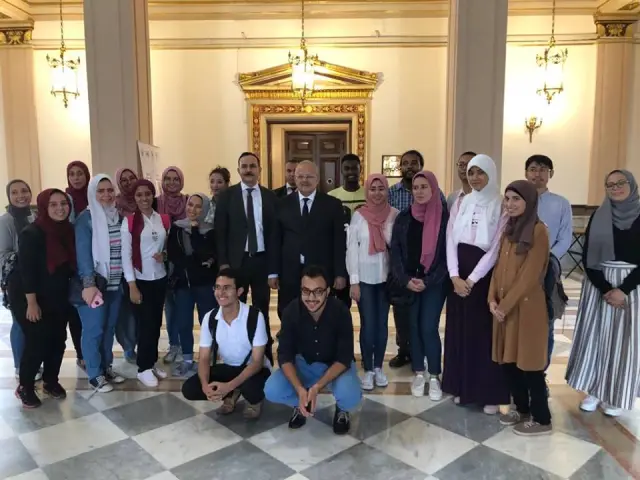
July Activity Report
31 July 2018
Global Japan Office Coordinator
MORITA Mitsuaki
Currently, Cairo University is in the middle of its long summer break, and I am currently struggling with Egyptian Arabic. I finally understand my students’ feelings towards hiragana, katakana and kanji.
As for my work at Cairo University, I have mostly been advising for master’s theses. Many master’s students are trying their hardest to graduate, so I am also working hard to advise them, and recently I find myself checking theses all day.
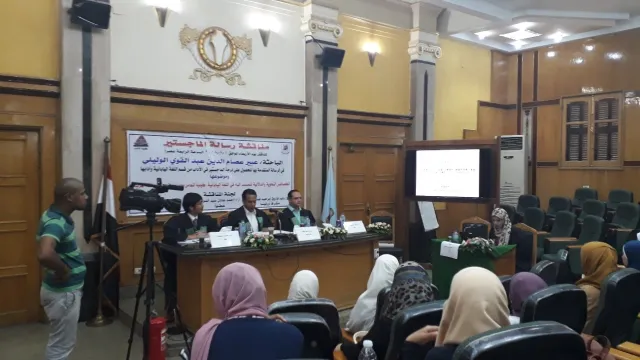
Many students are also in the last stages of preparing to study abroad at Japanese universities, and since the students themselves have to communicate with the coordinators of their host universities, I have been supporting them with anything they didn’t understand. Yesterday, some students invited me to have tea with them, which quickly became a consultation session with students asking me questions such as “what kind of preparation should I do before going?”, “do Japanese people have some understanding of Islam?”, and “what should I do about food issues?”
I made sure to firmly tell them that just going to Japan should not be their goal, and that they should decide what they want to do after that, and that if they don’t utilize each day, their Japanese won’t improve on its own. I want them to properly prepare themselves so they can have a more fruitful exchange experience.
June Activity Report
30 June 2019
Global Japan Office Coordinator
MORITA Mitsuaki
Ramadan (fasting) ended in Egypt on June 14, and all exams at Cairo University, which were stressful for students, ended on June 11. At the start of June, I was invited to Iftar (breaking the fast) by some students.
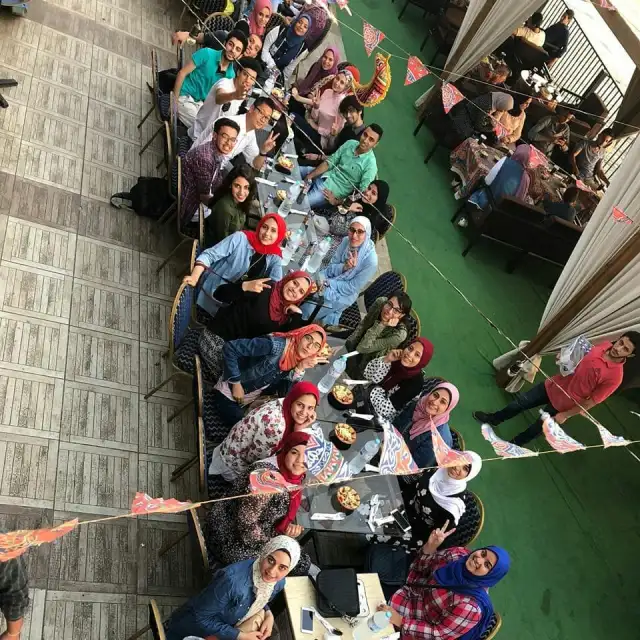
This year is also a FIFA World Cup year, and Egypt is participating for the first time in 28 years, so most cafes had their TVs going on the days of Egypt’s matches. It was fascinating to see Egyptians, who are usually lax on time when it comes to anything else, turning up 30 minutes early to watch the matches, during which they’d react to every move and cheer in loud voices. I also watched a few of Japan’s matches while marking my students’ assignments, during which some staff and regular customers struck up conversations with me, saying “Japan is so good” and “you lost, but it was a good match” – all in that uniquely friendly Egyptian way.
Now, the university is on its summer vacation (until mid-September), so I want my students to sincerely accept the results of their exams, revise, think about what they need to improve on, and prepare for the next semester. I will also take this opportunity to have one-on-one sessions with the students to discuss their self-study plans, what they’re thinking, and what I can do to teach classes more effectively.
May Activity Report
31 May 2018
Global Japan Office Coordinator
MORITA Mitsuaki
This year, Ramadan (fasting) began on May 17, so all classes at Cairo University ended in the first week of May, and the students were happy to have made it to the break. (Photo: Cairo University second-year students)
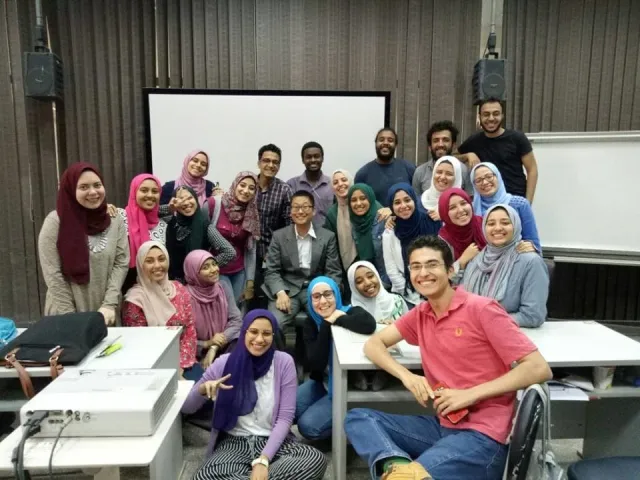
However, their happiness was short-lived as they had oral exams in the second week of May, and final exams mid-May. I was in charge of supervising the conversation oral exam for the second-year students, and since they have to convey their opinions and give counterarguments, some students are trembling the entire time, and some even burst into tears afterwards. As a whole I got the impression that most students were well-prepared, but I hope the students who didn’t do so well this time can do better next time.
Last month, I wrote that it was getting hotter, but I now know it wasn’t that hot. Since May began, there have been days where the temperature reaches 45 degrees, and since Ramadan began, the usually bustling daytime streets are now silent. When the sun goes down, and it becomes the time to break the fast, known as “Iftar”, everyone happily goes out to eat, and the streets become lively once more. Looking at Facebook, posts saying “I hate exams” and “it’s too hot” have become quite commonplace, but I hope they keep working hard until then end of exams on June 10.
April Activity Report
4 May 2018
Global Japan Office Coordinator
Morita Mitsuaki
It’s April in Cairo, and all of a sudden it is very hot. It’s also sandstorm season, and the rainiest season (in a country that doesn’t get much rain), so many students are catching colds. It seems that in Japan the phrase “springtime lethargy” has caught on, and I think the Egyptian students are also suffering from this with the weather changes and midterm exams. After the exams, I saw many students crying, but I think the students who prepared got the results they wanted.
Despite being stressful, there were some good things in April. The botanical garden near the university held a flower festival, so I went to look at the Egyptian style flowers with the first year students. The ninth of April was Sham El Nessim, also called Egyptian Easter, which has been translated as “shanmu-nashiimu” in Japanese (a festival where you smell the scent of spring). Apparently this festival originates back to Ancient Egypt. For this, I was invited alongside another Japanese teacher to the house of a first year student, where we ate a type of smoked herring called “ringa”.
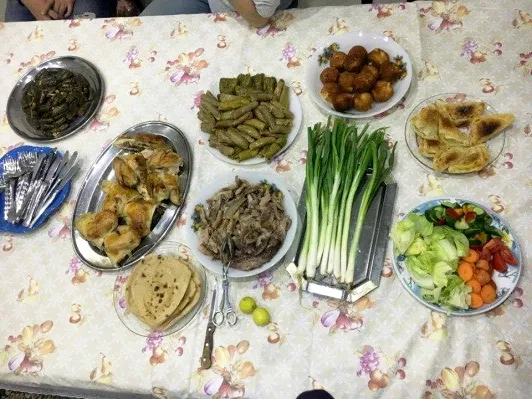
Also, I got two Japanese people who have lived in Cairo for more than six years to participate in my second and third year Japanese classes. The third years did an interview task, and the second years held a debate with the guests. The students seemed to be extremely nervous, but this worked in their favor as it drove them to work harder than usual. Many students told me that, although they were nervous, they would like to have more opportunities like this one, so if possible I definitely want to set up more meetings like this in the future.
